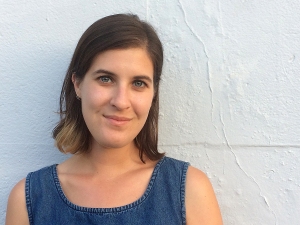The ALTA Emerging Translator Mentorship Program is designed to facilitate and establish a close working relationship between an experienced translator and an emerging translator on a project selected by the emerging translator. The mentorship duration is approximately one year. The emerging translator is expected to choose a project that can be completed in a year’s time, and they will only be advised on that particular project. Congratulations to this year’s Catalan mentee, Marlena Gittleman:
 Marlena Gittleman is a translator from Catalan and Spanish. She is currently earning a Ph.D. in Comparative Literature at UC Berkeley. A New Jersey native, Marlena obtained a B.A. in Comparative Literature at Barnard College in 2012 and studied abroad in Barcelona, where she later returned to continue studying Catalan. In New York, Marlena worked as a project manager at a translation agency and also volunteered for PEN’s Translation Committee. Through these studies and experiences, she developed a particular interest in translation for its nuanced engagement with language and literature.
Marlena Gittleman is a translator from Catalan and Spanish. She is currently earning a Ph.D. in Comparative Literature at UC Berkeley. A New Jersey native, Marlena obtained a B.A. in Comparative Literature at Barnard College in 2012 and studied abroad in Barcelona, where she later returned to continue studying Catalan. In New York, Marlena worked as a project manager at a translation agency and also volunteered for PEN’s Translation Committee. Through these studies and experiences, she developed a particular interest in translation for its nuanced engagement with language and literature.
Marlena began her Ph.D. at Berkeley in 2015, and her academic program includes Spanish, Catalan, English, and Portuguese. Marlena’s areas of research include genre crossings in 20th century fiction, with an emphasis on conceptualizing some of the global literary movements that shape, define, and even call into question that historical time period. She also works on transatlantic women’s writing, and she is particularly interested in questions of formal and linguistic experimentation, intersubjectivity, voice, the body, and matter, especially as they relate to gender. Marlena has written papers on such authors as Silvina Ocampo, Clarice Lispector, Virginia Woolf, Mina Loy, Montserrat Roig, and Mercè Rodoreda. She also works on the theory and practice of translation in relation to the field of comparative literature.
At Berkeley, Marlena is the co-organizer of the Translation Studies Working Group through the Townsend Center. In the fall of 2017, she will begin co-teaching a course in the Comparative Literature department. The theme of the class will be Multiple Americas, and it will look comparatively at North and South American literature, border crossings, translation, and performance.
Some of Marlena’s translations of contemporary Latin American and Latino writers and artists (such as Francisco Catalano, Johan Mijail, and Eli Neira) have been published in eL Paper, a bilingual arts magazine based in New York and Santiago, Chile. In addition to the project mentioned below, she is working on an ongoing project of translating some of Silvina Ocampo’s short stories that have not yet been published in English, as well as other works of contemporary Latin American fiction by emerging authors.
For the ALTA Catalan mentorship program, Marlena will be translating a semi-autobiographical collection of short stories by the Mallorcan writer Neus Canyelles, titled Mai no sé què fer fora de casa (“I never know what to do outside the house,” 2014). The collection itself adapts and re-writes stories by authors from the global canon, such as Natalia Ginzburg, Katherine Mansfield, and Nikolai Gogol. Through this project, Marlena looks forward to exploring questions of collaboration, intertextuality, re-translation, and perspectives on national and global literatures.
